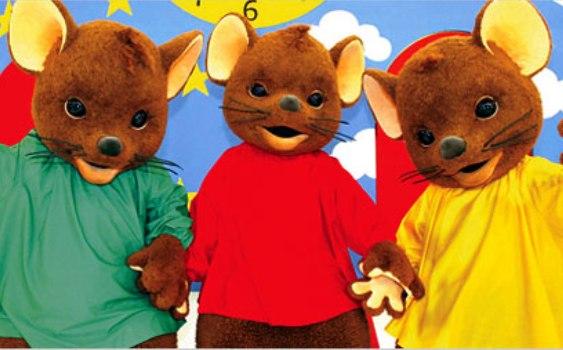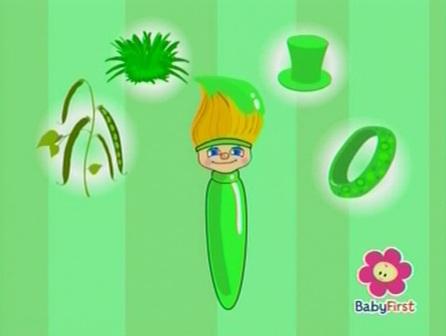
[I'm very happy to introduce our newest TVWW contributor, Monique Nazareth, a good friend and former colleague from Fresh Air. Her introductory column focuses on children's television, but that's just one of her many interests. Please welcome her to the fold. -DB]
By Monique Nazareth
I recently left a full-time job to take care of my toddler at home. Like many parents, I started out with the best intentions, saying there would be no television for baby. However, like most of the parents with whom I’ve spoken, occasional desperation causes me to break my own rule.

If I am going to put on the TV for my son, I want to make sure I am choosing something good. Among the choices that meet the requirement of a flexible schedule: the great programming of PBS and a cable channel devoted to little ones, Baby First TV. I watched a bit of both with my son. He zoned out whenever either was on.
I know, though, there will come a day when the images on the screen will capture his attention, so I started to research. A year ago the American Academy of Pediatrics released its latest recommendation, saying parents should limit the time their infants and toddlers spend in front of the TV. A more recent study looks at how background television can harm a child’s development. My feelings of guilt returned. Does it hurt my son when I sit him in front of Sesame Street?
"Many parents wonder how much is OK," Dr. Ari Brown, an Austin, TX, pediatrician and author of the American Academy of Pediatrics' 2011 policy statement regarding media and children under age two.
"The reality is that young children learn best from real people and real toys. Even shows that market themselves as educational are misleading because research shows that children under age two watch shows and it gets lost in translation — they do not understand the content within the context of televised programs."
Brown said many kids start understanding what they are watching at age two, though some children will "get it" as young as eighteen months.
"For children ages two and up, content definitely matters," she said. "Programs that emphasize language, pro-social behaviors or problem solving can truly be educational." Examples, she said, are Sesame Street and Dora the Explorer.
My 16-month-old son often zones out when I put on the TV, but he also laughs and reacts to things on the screen. Does that mean he’s processing the image? Brown said he may be entertained. However, she added, "Studies compare children who watch a televised educational program … to children who watch the live presentation (the same actor, but in the room with the child) [and] it is clear that kids under two learn the concept much more readily with the live presentation. Other studies present a program both backward and forward (one showed a Teletubbies program in reverse). The young children would laugh or watch the show either way it was shown, demonstrating they had no clue what was trying to be taught."
"It’s like candy won’t kill you as long as you have it in moderation," said Dr. Kathy Hirsh-Pasek, a psychology professor at Temple University. "It’s not going to hurt them, but we should not get kids to be couch potatoes." She said that while we don’t know what it will do for toddlers younger than three, things like Sesame Street can help some low income children over three by providing stimulation they might not otherwise get. However, Hirsh-Pasek warns, "We probably don't want them watching the nightly news, with all the killings and fires."
Dr. Jennifer Kotler, vice president of domestic research for Sesame Workshop, the non-profit organization behind Sesame Street, said they take the studies and recommendations by groups like the American Academy of Pediatrics seriously. She emphasized Sesame Street’s programming is geared toward preschool kids, but acknowledged that a lot of parents do expose younger children to it, too. Kotler referenced a project Sesame Workshop did a few years ago that showed the benefits of having parents engage with their toddlers while they are watching to create a shared media experience. She described it as a "conversation in the context of a loving relationship and characters doing nice things on the screen."
My questions and feelings of guilt are something Dr. Kotler said she's heard from many parents over the years, particularly as studies continue on children and the media. She pointed out there have been no studies with test subjects where one group of parents agrees to not put their toddlers in front of any TV and are compared to a group of parents that do. "I’ve always thought, what’s the alternative for parents who need that time?"

"You can't sit down with your child 24/7 and you can't keep the TV off 100 percent of the time," said Brown. "But know that the simple things you do every day — like chatting with your child while you prepare a meal — is really a teaching moment, and independent play is extremely valuable for your child. Know that your child will be just fine if you limit screens in your home.”
When it comes to utilizing 24-7 programming like Baby First TV, Hirsh-Pasek sees it as having food available at all times. "It’s there when you need it," she said.
Brown, however, extolled the benefits of allowing a child to entertain him or herself instead of turning on the television. "There is great value in independent play that allows a child to problem solve and learn on his own," Brown said.
It is almost unrealistic to think that we can take care of our little ones without any electronic interference or without giving ourselves a break. I’m just happy to know that when I need it, I can turn to my choice of Plaza Sesamo as a welcome occasional friend, and do it with less guilt than before.
Monique Nazareth is a former senior producer on NPR's The Diane Rehm Show, and spent almost 13 years as a producer on Fresh Air with Terry Gross. She holds a B.A. from the University of Iowa with a double major in journalism and mass communications and a minor in Portuguese.